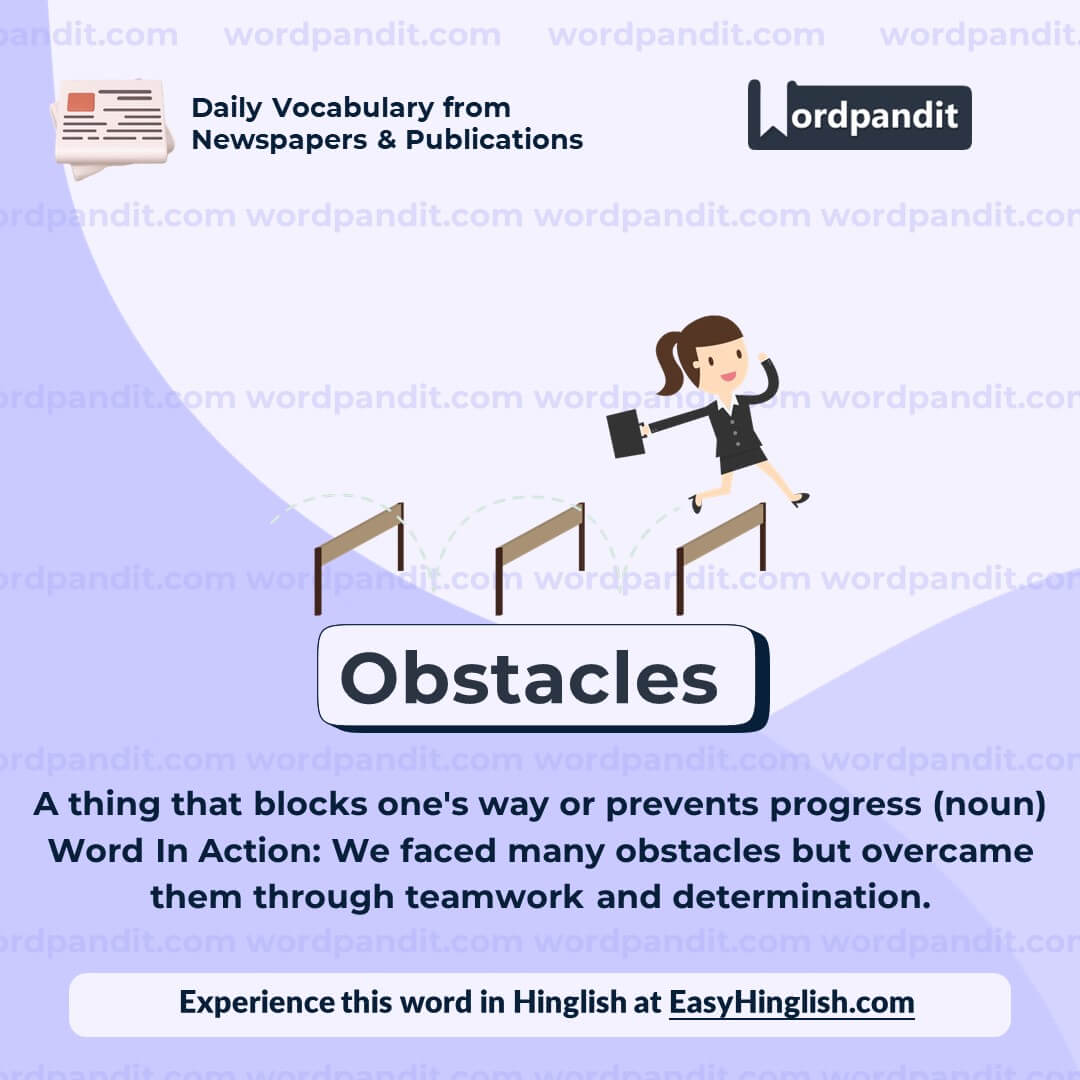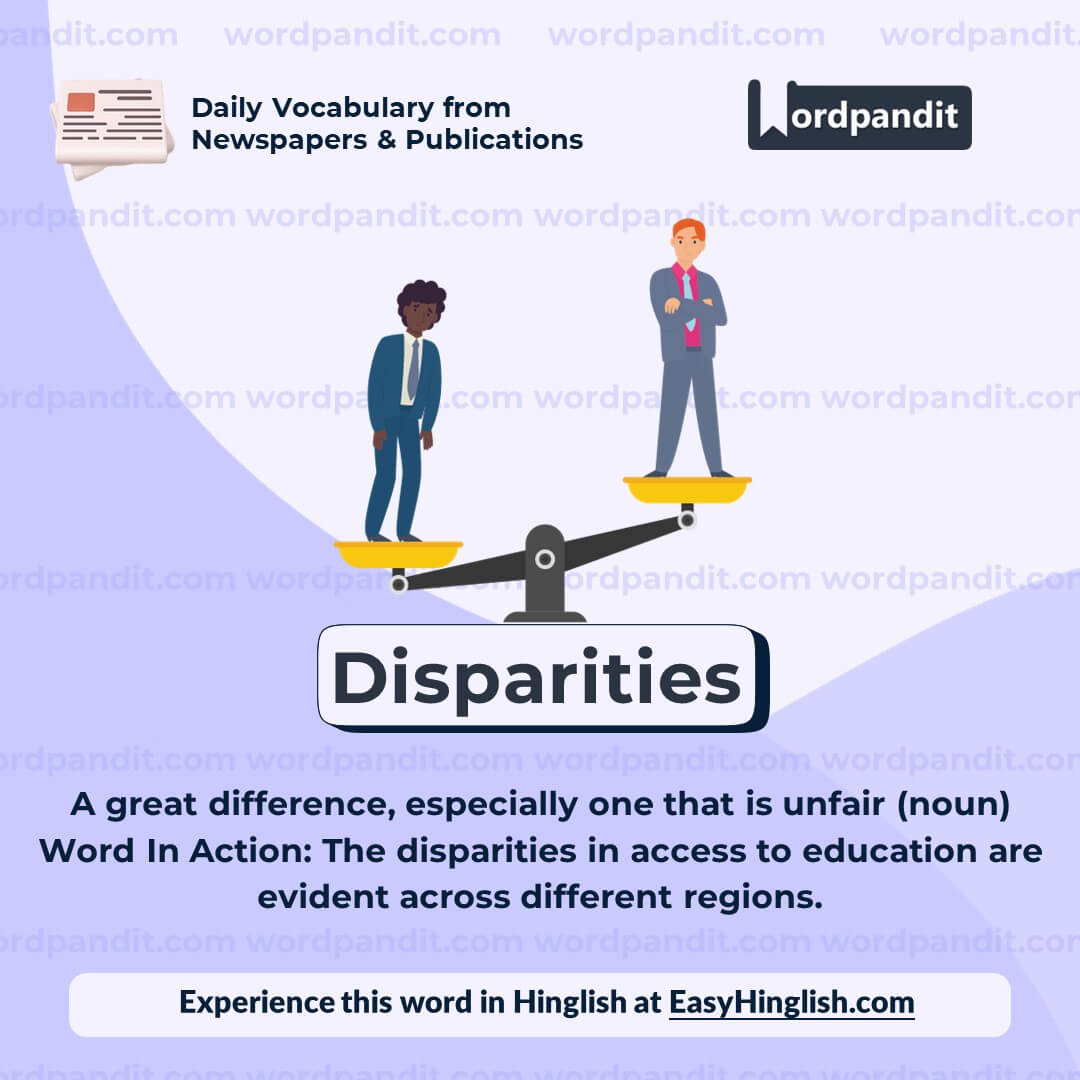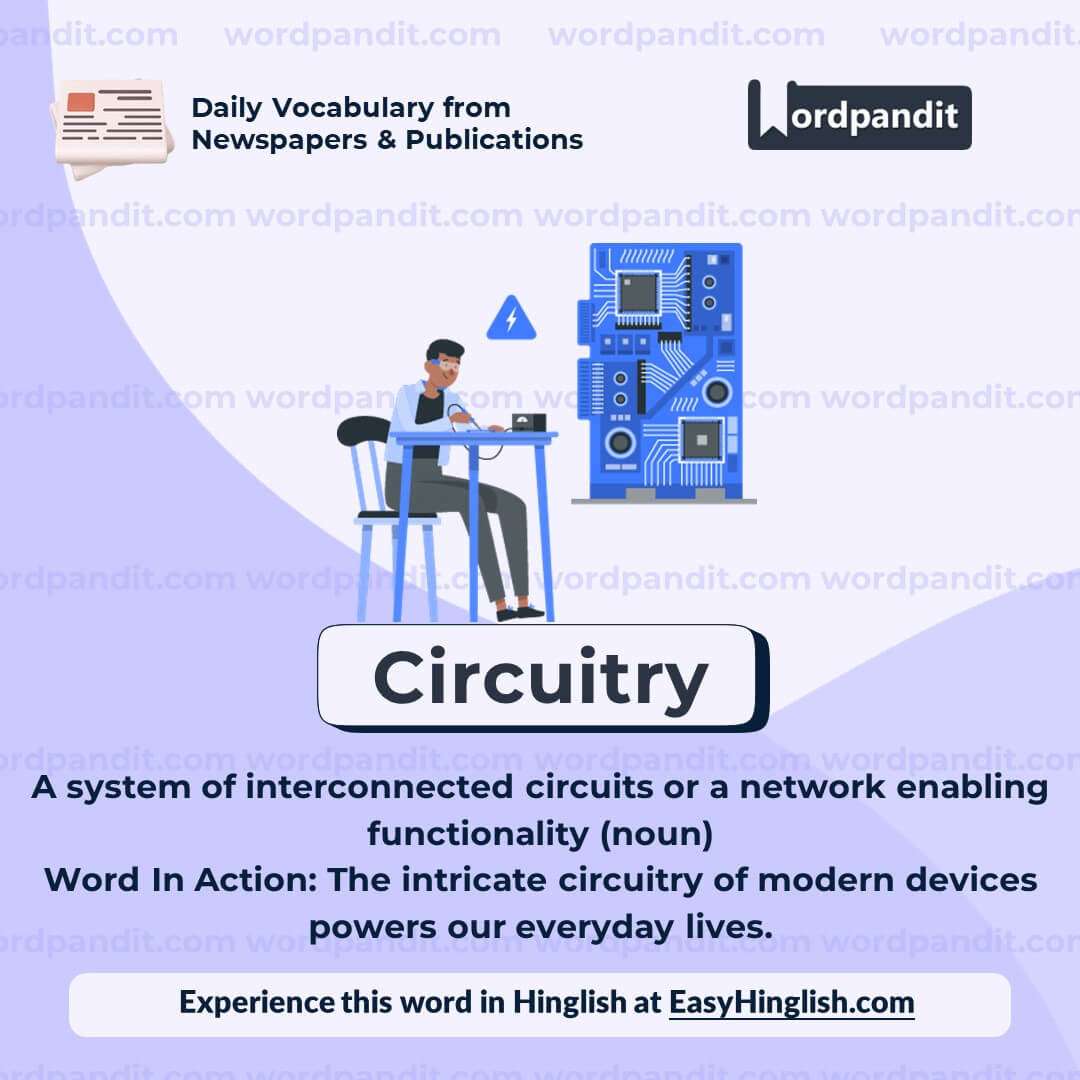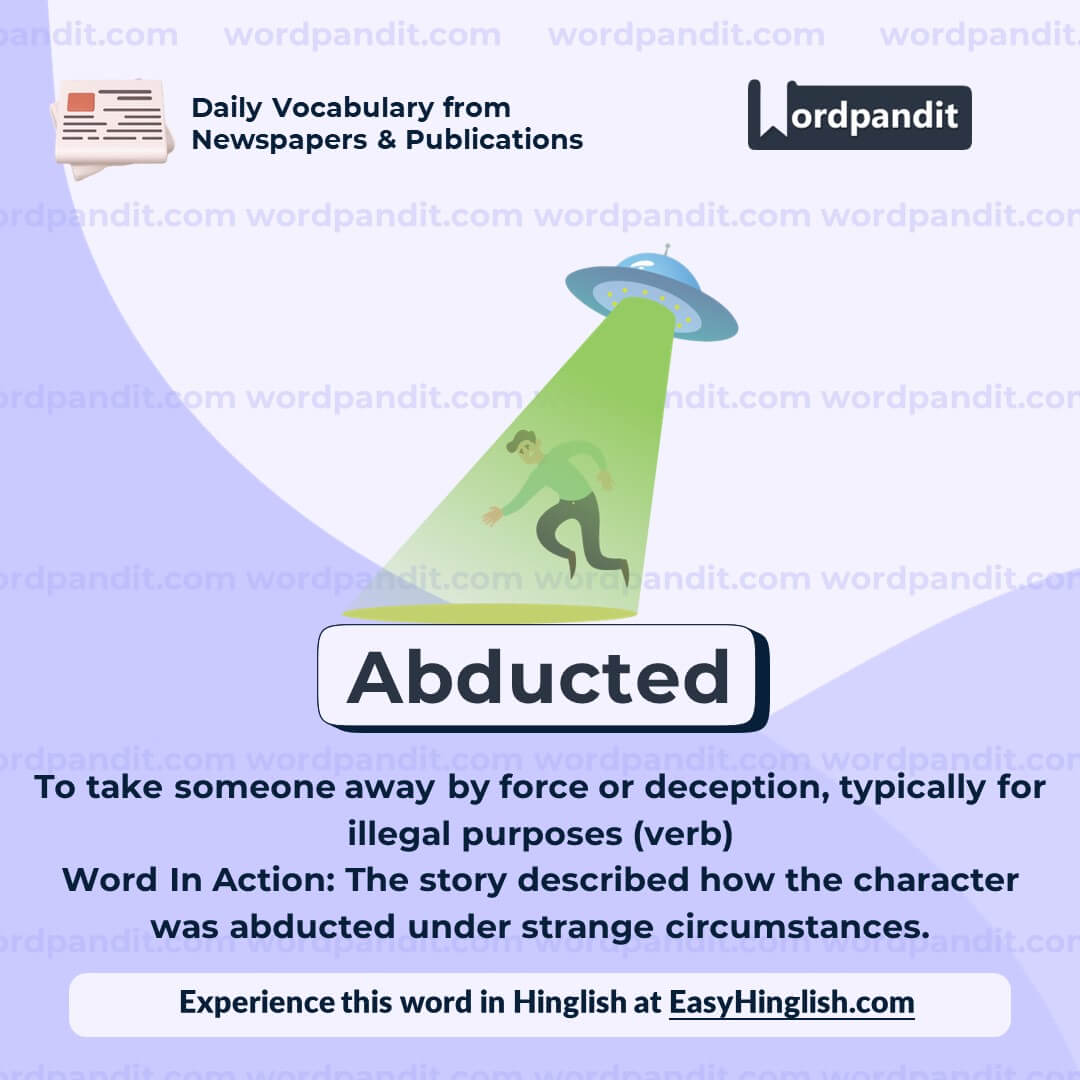Daily Vocabulary from International Newspapers and Publications
Expand Your Vocabulary with Wordpandit’s Global Vocabulary Hub
At Wordpandit, we are committed to helping you develop a truly global vocabulary by drawing from some of the most respected international publications. This section is designed to keep you ahead of the curve by introducing you to words that define global conversations and trends.
The Power of Global Sources
To help you think and communicate on a global scale, we curate vocabulary from renowned international sources, such as:
- The New York Times
- The Washington Post
- BBC
- The Guardian
- The Economist
- Scientific American
- Psychology Today
- And many more...
Stay Global, Stay Competitive
Our daily updates from international publications ensure you are consistently exposed to new words that reflect global news and developments, making sure your vocabulary is not only current but also globally relevant.
Enhance Your Global Perspective
Whether you’re preparing for international exams, aiming to excel in global business communication, or want to enhance your language skills for personal growth, Wordpandit offers the resources you need to thrive in a global context.
Effective Learning, Global Reach
Our learning methodology combines global examples, memory aids, and interactive activities, allowing you to internalize new words effectively and apply them in real-world scenarios.
Begin Your Global Vocabulary Journey Now!
Why Choose Wordpandit?
Practical Learning: Focus on words you'll actually encounter in real-world reading, enhancing your comprehension and communication skills.
Diverse Content: From current affairs to scientific breakthroughs, our varied sources expose you to vocabulary across multiple domains.
Effortless Integration: Make Wordpandit a part of your daily routine. Just a few minutes each day can significantly boost your lexicon over time.
Your Path to Vocabulary Mastery
- Visit our Daily Vocabulary section regularly
- Explore new words and their usage in context
- Practice incorporating these words into your own writing and speech
- Track your progress as your vocabulary expands
Start Your Journey Today
Embark on your vocabulary enhancement journey with Wordpandit. By consistently engaging with our daily posts, you'll build a robust vocabulary that serves you well in academic, professional, and personal contexts.
Remember, a word a day keeps linguistic limitations at bay. Make Wordpandit your daily companion in the quest for vocabulary excellence!
WORD-1: Obstacles
Context:
"The question is not whether Africa can develop – it is how to remove the obstacles blocking its progress." - Aljazeera
Explanatory Paragraph:
The word "obstacles" refers to things that hinder or prevent progress or achievement. It could be a physical, emotional, or figurative barrier that stands in the way of a goal. In the given context, the word highlights the challenges Africa faces in its path toward development, emphasizing the need to overcome these hindrances.
Meaning: A thing that blocks one's way or prevents progress (noun).
Pronunciation: "OB-stuh-kuls"
Difficulty Level: ⭐⭐ Beginner
Etymology: Derived from the Latin word "obstaculum," which means "something standing in the way," based on "ob" (against) + "stare" (to stand).
Synonyms & Antonyms:
Synonyms: Barrier, hindrance, hurdle, impediment, roadblock
Antonyms: Aid, assistance, help, support, facilitator
Usage Examples:
- The lack of proper infrastructure is one of the major obstacles to economic development in rural areas.
- She faced numerous obstacles during her journey to becoming a successful entrepreneur.
- Education is the key to overcoming the obstacles of poverty and inequality.
- The athlete overcame several physical obstacles to win the gold medal.
Cultural Reference:
"The greater the obstacle, the more glory in overcoming it." - A famous quote attributed to Molière, emphasizing the value of perseverance in the face of challenges.
Think About It:
What are some of the most common obstacles people face in their daily lives, and how can they be addressed effectively?
Quick Activity:
Write down three obstacles you have faced in the past week and brainstorm one possible solution for each. Share your ideas with a friend or mentor.
Memory Tip:
Remember "obstacles" by breaking it down: "ob-" means "against," and "-stac-" sounds like "stack," as if something is stacked in your way.
Real-World Application:
The concept of obstacles is widely applicable in personal goal-setting, project management, and even global issues like climate change, where identifying and overcoming barriers is key to success.
WORD-2: Disparities
Context:
"This must change. Similarly, our healthcare systems need targeted investment to reduce mortality rates and address stark health disparities across the continent." - Aljazeera
Explanatory Paragraph:
The word "disparities" refers to differences or inequalities, especially those that are unfair or unjust. In the context of the provided sentence, "health disparities" highlight unequal access to healthcare or differences in health outcomes among populations, often caused by economic, social, or geographic factors.
Meaning: A great difference, especially one that is unfair (noun).
Pronunciation: "dih-SPAIR-uh-tees"
Difficulty Level: ⭐⭐⭐ Intermediate
Etymology: From the Latin word "disparitas," derived from "dispar" (unequal), which combines "dis-" (apart) and "par" (equal).
Synonyms & Antonyms:
Synonyms: Inequality, gap, imbalance, divergence, inconsistency
Antonyms: Equality, uniformity, parity, consistency, fairness
Usage Examples:
- Economic disparities between urban and rural areas have widened in recent years.
- Gender disparities in the workplace continue to be a pressing issue worldwide.
- The report highlights stark disparities in access to education among different income groups.
- Efforts to address racial disparities in healthcare have led to the development of targeted policies.
Cultural Reference:
The term "health disparities" is frequently used in public health discussions. For example, the World Health Organization (WHO) often highlights the need to reduce disparities in healthcare access, particularly in underserved communities worldwide.
Think About It:
What are some examples of disparities you see in your community, and what steps can be taken to address them effectively?
Quick Activity:
List three areas in society where disparities are most evident (e.g., education, income, or healthcare). Research one disparity and write a short paragraph about its causes and potential solutions.
Memory Tip:
Remember "disparities" by associating it with "different" and "par" (equal). Disparities are differences where things are not on par with each other.
Real-World Application:
Understanding disparities is essential in fields like public policy, healthcare, and education, where addressing inequality is a primary goal. For instance, identifying income disparities helps governments design fair taxation systems and welfare programs.
WORD-3: Circuitry
Context:
"Treaties are the circuitry that make relations between states function." - Aljazeera
Explanatory Paragraph:
The word "circuitry" refers to interconnected systems or networks that enable something to function, much like electrical circuits facilitate the flow of energy. In the given context, "circuitry" is used metaphorically to describe how treaties serve as a vital framework that supports and maintains the functioning of relationships between nations.
Meaning: A system of interconnected circuits or a network enabling functionality (noun).
Pronunciation: "SUR-kuh-tree"
Difficulty Level: ⭐⭐⭐ Intermediate
Etymology: From the word "circuit," derived from Latin "circuitus" (a going around) and the suffix "-ry," indicating a system or network.
Synonyms & Antonyms:
Synonyms: Network, system, framework, mechanism, interconnection
Antonyms: Isolation, disconnection, separation
Usage Examples:
- The computer's circuitry malfunctioned, causing the system to shut down unexpectedly.
- Social networks can be thought of as the circuitry that connects individuals across the globe.
- The factory's electrical circuitry was upgraded to prevent power outages.
- Diplomatic agreements act as the circuitry that keeps international relations stable.
Cultural Reference:
In the realm of technology, circuitry forms the backbone of all electronic devices, from smartphones to supercomputers. The metaphorical use of "circuitry" is often seen in political and social commentary, as in the context provided by Aljazeera.
Think About It:
How do the "circuitry" or systems in your daily life—whether digital, social, or political—impact the way you interact with others or solve problems?
Quick Activity:
Draw a diagram representing a system you use daily (e.g., a transportation network or a workflow at work). Label the parts and explain how the "circuitry" of the system keeps it functioning.
Memory Tip:
Think of "circuitry" as the "circular connections" that keep a system flowing smoothly, just like wires in an electrical circuit.
Real-World Application:
The concept of circuitry is vital in understanding how systems work, whether in electronics, biology (e.g., neural circuitry), or societal structures. For example, in diplomacy, treaties and alliances function as the "circuitry" that keeps peace and cooperation alive.
WORD-4: Abducted
Context:
"All those named by Hamas for the next exchange are female Israel Defense Forces (IDF) observation troops who were abducted in Nahal Oz during the group’s surprise attack on southern Israel on 7 October 2023, when their base was overrun." - The Guardian
Explanatory Paragraph:
The word "abducted" refers to the act of forcibly taking someone away, often against their will and for unlawful purposes. In the provided context, it describes how members of the Israel Defense Forces (IDF) were captured and taken during an attack by Hamas. The term often implies an act of kidnapping or coercion.
Meaning: To take someone away by force or deception, typically for illegal purposes (verb).
Pronunciation: "ab-DUKT-ed"
Difficulty Level: ⭐⭐ Beginner
Etymology: From Latin "abductus," the past participle of "abducere," meaning "to lead away." The root "ab-" means "away," and "ducere" means "to lead."
Synonyms & Antonyms:
Synonyms: Kidnapped, captured, seized, taken, snatched
Antonyms: Freed, released, liberated, rescued
Usage Examples:
- The spy was abducted by enemy agents while on a secret mission.
- Authorities launched a nationwide search for the abducted child.
- During the conflict, several villagers were abducted and held hostage.
- The movie depicted a daring escape by a person who had been abducted by criminals.
Cultural Reference:
The concept of abduction has been a recurring theme in literature and films, such as in "Taken," where a father searches for his abducted daughter, showcasing both the emotional toll and the efforts to rescue abductees.
Think About It:
What are some measures that governments and communities can take to prevent abductions in conflict zones and ensure the safety of civilians?
Quick Activity:
Imagine you are writing a news report. Create a short paragraph using the word "abducted" to describe a fictional event, ensuring clarity and accuracy.
Memory Tip:
Think of "abducted" as "a person being led away" — the prefix "ab-" means "away," and "duct" is similar to "conduct" or "lead."
Real-World Application:
The term "abducted" is frequently used in journalism, law enforcement, and international relations to report on kidnappings and forced disappearances, especially in contexts of war, terrorism, and crime prevention efforts.
WORD-5: Speculation
Context:
"There has been speculation that Yehoud, who holds joint German and Israeli citizenship, is not being held by Hamas but by another militant faction, Palestinian Islamic Jihad." - The Guardian
Explanatory Paragraph:
The word "speculation" refers to forming ideas, opinions, or assumptions about something without solid evidence or confirmation. In the context of the sentence, it describes unconfirmed theories about who is holding Yehoud, indicating uncertainty or lack of reliable information.
Meaning: The act of forming theories or assumptions without firm evidence (noun).
Pronunciation: "speck-yoo-LAY-shun"
Difficulty Level: ⭐⭐ Beginner
Etymology: From the Latin word "speculatio," meaning "contemplation" or "watching," derived from "speculari" (to observe).
Synonyms & Antonyms:
Synonyms: Conjecture, assumption, theory, guess, supposition
Antonyms: Fact, certainty, evidence, reality, confirmation
Usage Examples:
- The speculation about a potential merger caused the company’s stock price to surge.
- There was widespread speculation regarding the candidate’s chances of winning the election.
- In the absence of evidence, the detective avoided making any speculation about the case.
- The rumors were dismissed as mere speculation until official announcements were made.
Cultural Reference:
In financial markets, "speculation" is a common term used to describe high-risk investments made with the hope of significant returns. For example, speculative trading often involves buying stocks or cryptocurrencies based on predictions about their future value.
Think About It:
Why do people often resort to speculation in the absence of confirmed information, and what are the potential risks of doing so?
Quick Activity:
Write down a situation in your life where speculation caused confusion or led to incorrect assumptions. Reflect on how having more facts might have helped.
Memory Tip:
Think of "speculation" as "speculating" or "guessing," where you form ideas by "watching" or observing without solid proof—just like the root "spec" means "to look."
Real-World Application:
The word "speculation" is frequently used in journalism, science, and finance to describe unverified claims or hypotheses. For example, speculation in the media about political events can influence public perception, even in the absence of evidence.


















